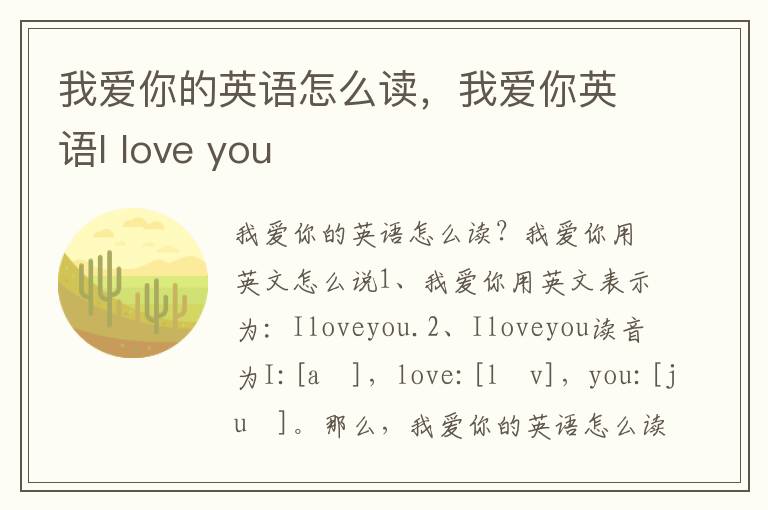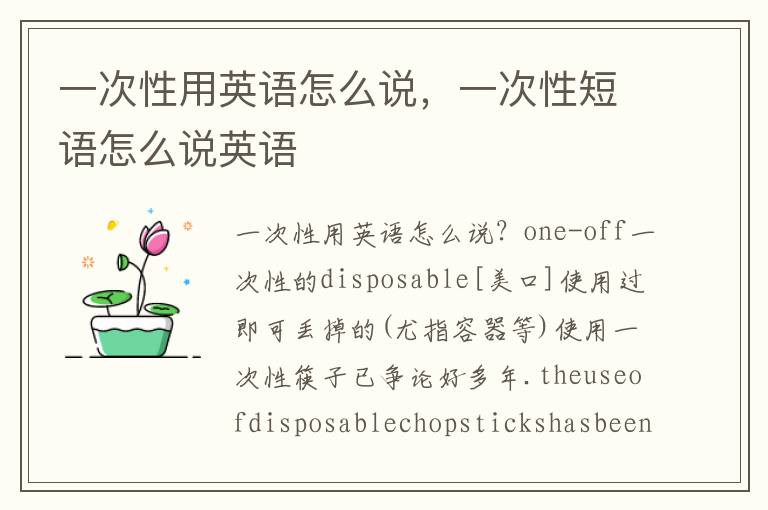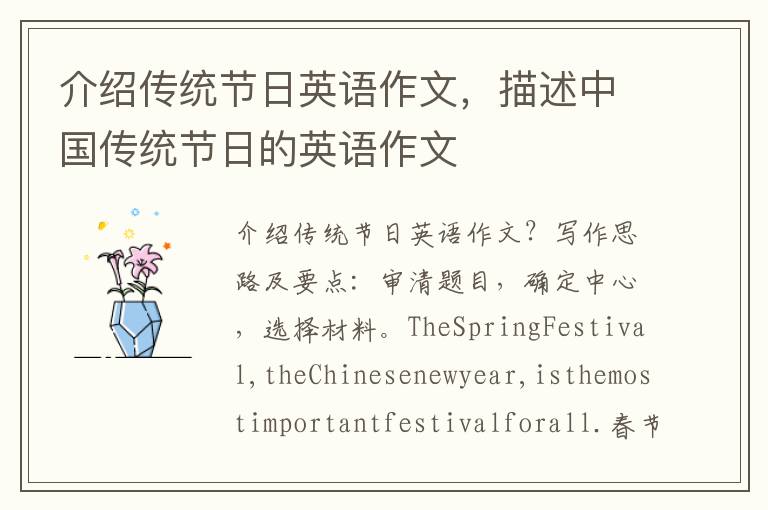【简介】感谢网友“雕龙文库”参与投稿,这里小编给大家分享一些,方便大家学习。
解指技巧
单项选择是一种容量大、考查面广的题型。它可集中考查词法、句法、语法知识。因此在各级各类考试中,单项选择是必不可少的题型。
要做好单项选择题,首先必须熟练掌握句型、固定搭配、习惯用法、语法等方面的基础知识。还应该了解一些解题技巧,提高解题的综合能力。
解答单项选择题,一般要经过四个阶段 :阅读审题——观察分析——选择判断——复查验证。
1. 阅读审题 :首先要默读试题中的英语句子,了解空格在句中所处的位置,句子缺少什么成份,初步确定一个答案的范围。根据备选答案二者结合起来就会大致明白考查什么。例如 :
He goes to work by bus .
A. So do I B. I so do C. I do so D. So am I
默读此题后,就不难知道,此题缺少的是一个跟前句有关的一个句子;再根据选项就会清楚此题是考查副词“so”一词的用法(前边的情况也适于另一个人或物),只能选A。
2. 观察分析 :这是一个快速而又严密的思维过程。要求将试题中所提供的条件和备选答案的情况结合起来去分析、推理、排除那些明显不符合试题,甚至本身就有错的各选项目,再在剩余的备选中比较分析。例如 :
Wang Fang is young,but she plays ping-pong her mother.
A. as good as B. as well as
C. as better as D. as best as
根据观察分析就会清楚,C、D两项本身就不能成立,应先排除,只能在A、B两项中选。
3. 选择判断 :在分析句子和备选答案的基础上,经过反复验证,选出一个使句子语法正确、语意通顺,附合逻辑道理的答案。
就上例所示,先排除了C、D,就在A、B两者中选。因句中“play”为一个行为动词,需用一个副词来修饰,故应选择B。
4. 复查验证 :将所选答案放在句中空格处再默读全句。首先看是否顺口,再在读法、意思和逻辑关系上推敲一下,完全符合条件则可放心。
这就是做单项选择题的总过程。其次,事实上大多数同学在许多情况下靠语感选择答案,所谓语感就是平时知识的积累,是技巧的熟练,就是读来顺口、有把握。特别是情景反应式选择题运用此法效果更佳。例如 :
1)—“Happy New Year!”
—“ ”.
A. Happy New Year, too B. Thank you very much
C. You’re right D. The same to you
根据平时练习的情景对话,一读就会感到D是正确的。
2)—“Mum,can I watch TV now?”
—No,you must finish your homework first.
A. doing B. do C. to do D. done
根据我们平时已学的“finish”一词的语法知识“finish doing sth. ”一读就会发现,空白处只有填“doing”才是正确的,读来顺口,就会马上确定A。
【经典范例引路】
例1 of the twins passed the exam because they worked hard at their lessons.
A. Every B. Neither C. None D. Both
简析 :此题选D。B、C两项是否定含义的词,在句中逻辑上说不通。另外注意neither强调“两者都不”,none强调三者以上的“都不”。A项的 every只能作定语,不能作主语、表语或宾语。
例2 the window. What’s happening there?
A. Look off B. Look over C. Look out of D. Look for
简析 :此题选C。此题考查带look的短评动词的用法。根据第二个句子问外面发生了什么事,可推知第一句是让“往窗外看”,故用look out of。look over是指医生“检查”病人,look for是“寻找”,A项短语不正确。
例3 bad weather we are having !We’ve never had rainy days.
A. What a;such B. How;so C. What;such D. What;so
简析 :此题选C。第一个句子是感叹句,中心词是名词 weather,故应填 what,而非 how,又因 weather是不可数名词,所以 what后面不能加a。第二个句子中的 days是名词,故应填such,而非so(so修饰形容词或副词)。
【综合能力训练】
Ⅰ. 单项选择。
( )1. He came to China 1998.
A. from B. since C. at D. in
( )2. — did you buy the new bag?
—Last Monday.
A. Where B. How C. When D. Who
( )3. Mr. Yang is too to go on walking.
A. strong B. tall C. kind D. tired
( )4. trees are cut down every year.
A. Thousand B. Thousands of C. Thousands D. Thousand of
( )5. He's lived here 1980.
A. after B. in C. from D. since
( )6. —Can you understand me ?
—Sorry, I can understand you.
A. hardly B. almost C. nearly D. ever
( )7. — does it take me to go from my school to your school ?
—About five minutes.
A. How many B. How far C. How much D. How long
( )8. —Hello. May I speak to Jim, please ?
— , please ?
A. Who are you B. How is he C. Who is that D. What are you
( )9. She asked me if I knew whose pen .
A. is it B. it was C. it is D. was it
( )10. It's cold outside. You'd better your coat.
A. put on B. put away C. put back D. put up
( )11. —I have finished my homework.
—When you it ?
A. have; finished B. do; finish
C. did; finish D. will; finish
( )12. —Can I your bike ?
—With pleasure. But you mustn't it to others.
A. lend;borrow B. borrow;lend C. carry;lend D. borrow;keep
( )13. of them has an English dictionary.
A. Every B. Each C. Both D. All
( )14. It me about ten minutes to go to school by bike every day.
A. pays B. spends C. costs D. takes
( )l5. Don't tell anybody about it. Keep it you and me.
A. among B. between C. in D. with
( )16. I’d like to the word in French.
A. say B. speak C. tell D. talk
( )17. A strong wind will arrive in Harbin. It will much rain.
A. bring B. take C. carry D. get
( )18. It's a beautiful stamp.
A. quite B. too C. very D. so
( )19. He doesn't know English because he has studied it for only __________ weeks.
A. much; a few B. little; few C. few; little D. a few; a little
( )20. It's about walk from my home.
A. ten minute B. ten minutes C. ten minute's D. ten-minutes
( )21. —Is this your sock ?
—Yes, it is. But where is ?
A. the others B. the other one C. others D. other one
( )22. The radio is too noisy. Would you please a little?
A. turn it off B. turn it down C. stop it from D. pick it up
( )23. The woman had to do the farm work herself, ?
A. did she B. didn’t she C. had she D. wasn’t she
( )24. He has for about twelve years.
A. bought the house B. left here
C. lived here D. gone there
( )25. I’d like some water, but he wants .
A. two bottle orange B. two bottles of orange
C. two bottle oranges D. two bottles of oranges
( )26. Mike is learning a computer.
A. how can he use B. how to use
C. how he use D. how to using
( )27. You are just for the game. Please come and join us.
A. in time B. on time C. at times D. at the time
( )28. Who will teach English next term?
A. ourselves B. us C. our D. ours
( )29. Everything is lighter on the moon than on the earth.
A. so B. more C. much D. very
( )30. — do you go to see your parents?
—Once a week.
A. How often B. How long C. How soon D. When
[参考答案]
综合能力训练
Ⅰ. 1—5 DCDBD 6—10 ADCBA 11—15 CBBDB 16—20 AAAAB 21—25 BBBCB 26—30 BABCA
点击看作者原文:http://home.eduu.com/space.php?uid=134570do=blogid=5871
解指技巧
单项选择是一种容量大、考查面广的题型。它可集中考查词法、句法、语法知识。因此在各级各类考试中,单项选择是必不可少的题型。
要做好单项选择题,首先必须熟练掌握句型、固定搭配、习惯用法、语法等方面的基础知识。还应该了解一些解题技巧,提高解题的综合能力。
解答单项选择题,一般要经过四个阶段 :阅读审题——观察分析——选择判断——复查验证。
1. 阅读审题 :首先要默读试题中的英语句子,了解空格在句中所处的位置,句子缺少什么成份,初步确定一个答案的范围。根据备选答案二者结合起来就会大致明白考查什么。例如 :
He goes to work by bus .
A. So do I B. I so do C. I do so D. So am I
默读此题后,就不难知道,此题缺少的是一个跟前句有关的一个句子;再根据选项就会清楚此题是考查副词“so”一词的用法(前边的情况也适于另一个人或物),只能选A。
2. 观察分析 :这是一个快速而又严密的思维过程。要求将试题中所提供的条件和备选答案的情况结合起来去分析、推理、排除那些明显不符合试题,甚至本身就有错的各选项目,再在剩余的备选中比较分析。例如 :
Wang Fang is young,but she plays ping-pong her mother.
A. as good as B. as well as
C. as better as D. as best as
根据观察分析就会清楚,C、D两项本身就不能成立,应先排除,只能在A、B两项中选。
3. 选择判断 :在分析句子和备选答案的基础上,经过反复验证,选出一个使句子语法正确、语意通顺,附合逻辑道理的答案。
就上例所示,先排除了C、D,就在A、B两者中选。因句中“play”为一个行为动词,需用一个副词来修饰,故应选择B。
4. 复查验证 :将所选答案放在句中空格处再默读全句。首先看是否顺口,再在读法、意思和逻辑关系上推敲一下,完全符合条件则可放心。
这就是做单项选择题的总过程。其次,事实上大多数同学在许多情况下靠语感选择答案,所谓语感就是平时知识的积累,是技巧的熟练,就是读来顺口、有把握。特别是情景反应式选择题运用此法效果更佳。例如 :
1)—“Happy New Year!”
—“ ”.
A. Happy New Year, too B. Thank you very much
C. You’re right D. The same to you
根据平时练习的情景对话,一读就会感到D是正确的。
2)—“Mum,can I watch TV now?”
—No,you must finish your homework first.
A. doing B. do C. to do D. done
根据我们平时已学的“finish”一词的语法知识“finish doing sth. ”一读就会发现,空白处只有填“doing”才是正确的,读来顺口,就会马上确定A。
【经典范例引路】
例1 of the twins passed the exam because they worked hard at their lessons.
A. Every B. Neither C. None D. Both
简析 :此题选D。B、C两项是否定含义的词,在句中逻辑上说不通。另外注意neither强调“两者都不”,none强调三者以上的“都不”。A项的 every只能作定语,不能作主语、表语或宾语。
例2 the window. What’s happening there?
A. Look off B. Look over C. Look out of D. Look for
简析 :此题选C。此题考查带look的短评动词的用法。根据第二个句子问外面发生了什么事,可推知第一句是让“往窗外看”,故用look out of。look over是指医生“检查”病人,look for是“寻找”,A项短语不正确。
例3 bad weather we are having !We’ve never had rainy days.
A. What a;such B. How;so C. What;such D. What;so
简析 :此题选C。第一个句子是感叹句,中心词是名词 weather,故应填 what,而非 how,又因 weather是不可数名词,所以 what后面不能加a。第二个句子中的 days是名词,故应填such,而非so(so修饰形容词或副词)。
【综合能力训练】
Ⅰ. 单项选择。
( )1. He came to China 1998.
A. from B. since C. at D. in
( )2. — did you buy the new bag?
—Last Monday.
A. Where B. How C. When D. Who
( )3. Mr. Yang is too to go on walking.
A. strong B. tall C. kind D. tired
( )4. trees are cut down every year.
A. Thousand B. Thousands of C. Thousands D. Thousand of
( )5. He's lived here 1980.
A. after B. in C. from D. since
( )6. —Can you understand me ?
—Sorry, I can understand you.
A. hardly B. almost C. nearly D. ever
( )7. — does it take me to go from my school to your school ?
—About five minutes.
A. How many B. How far C. How much D. How long
( )8. —Hello. May I speak to Jim, please ?
— , please ?
A. Who are you B. How is he C. Who is that D. What are you
( )9. She asked me if I knew whose pen .
A. is it B. it was C. it is D. was it
( )10. It's cold outside. You'd better your coat.
A. put on B. put away C. put back D. put up
( )11. —I have finished my homework.
—When you it ?
A. have; finished B. do; finish
C. did; finish D. will; finish
( )12. —Can I your bike ?
—With pleasure. But you mustn't it to others.
A. lend;borrow B. borrow;lend C. carry;lend D. borrow;keep
( )13. of them has an English dictionary.
A. Every B. Each C. Both D. All
( )14. It me about ten minutes to go to school by bike every day.
A. pays B. spends C. costs D. takes
( )l5. Don't tell anybody about it. Keep it you and me.
A. among B. between C. in D. with
( )16. I’d like to the word in French.
A. say B. speak C. tell D. talk
( )17. A strong wind will arrive in Harbin. It will much rain.
A. bring B. take C. carry D. get
( )18. It's a beautiful stamp.
A. quite B. too C. very D. so
( )19. He doesn't know English because he has studied it for only __________ weeks.
A. much; a few B. little; few C. few; little D. a few; a little
( )20. It's about walk from my home.
A. ten minute B. ten minutes C. ten minute's D. ten-minutes
( )21. —Is this your sock ?
—Yes, it is. But where is ?
A. the others B. the other one C. others D. other one
( )22. The radio is too noisy. Would you please a little?
A. turn it off B. turn it down C. stop it from D. pick it up
( )23. The woman had to do the farm work herself, ?
A. did she B. didn’t she C. had she D. wasn’t she
( )24. He has for about twelve years.
A. bought the house B. left here
C. lived here D. gone there
( )25. I’d like some water, but he wants .
A. two bottle orange B. two bottles of orange
C. two bottle oranges D. two bottles of oranges
( )26. Mike is learning a computer.
A. how can he use B. how to use
C. how he use D. how to using
( )27. You are just for the game. Please come and join us.
A. in time B. on time C. at times D. at the time
( )28. Who will teach English next term?
A. ourselves B. us C. our D. ours
( )29. Everything is lighter on the moon than on the earth.
A. so B. more C. much D. very
( )30. — do you go to see your parents?
—Once a week.
A. How often B. How long C. How soon D. When
[参考答案]
综合能力训练
Ⅰ. 1—5 DCDBD 6—10 ADCBA 11—15 CBBDB 16—20 AAAAB 21—25 BBBCB 26—30 BABCA
点击看作者原文:http://home.eduu.com/space.php?uid=134570do=blogid=5871









